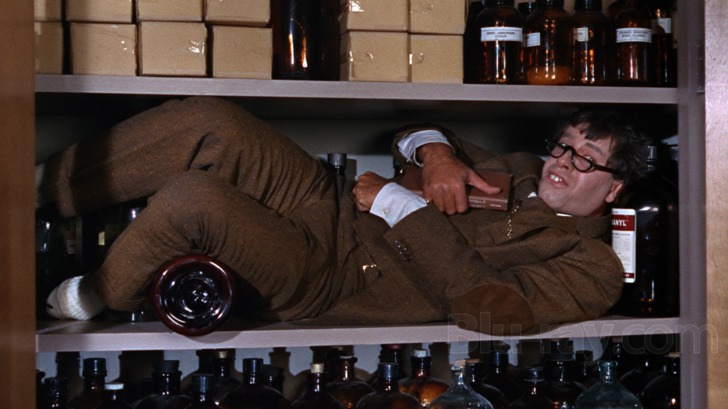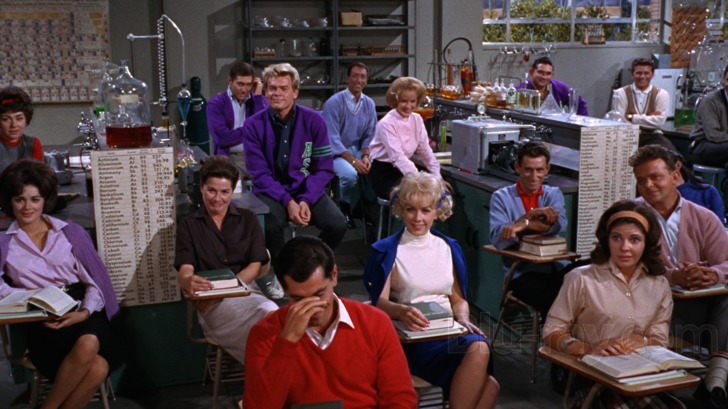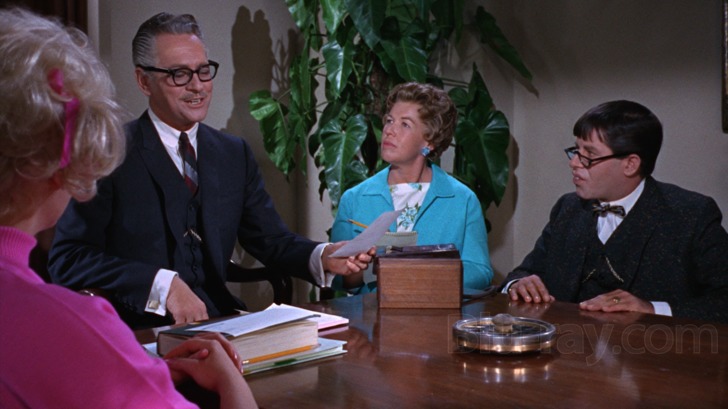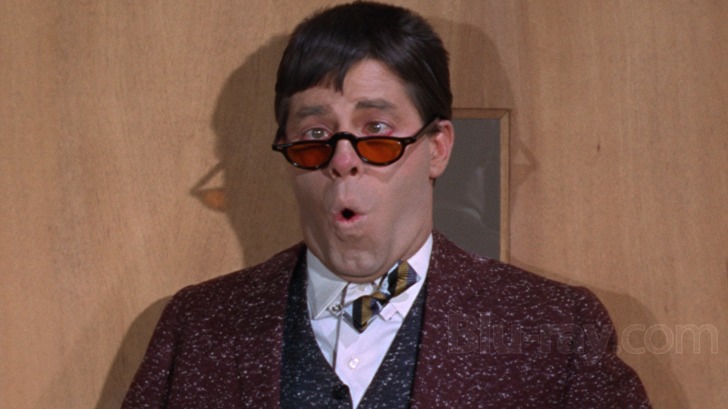The Nutty Professor Blu-ray Movie
HomeThe Nutty Professor Blu-ray Movie 
50th Anniversary Edition | Ultimate Collector's Edition / Blu-ray + DVD + CDWarner Bros. | 1963 | 107 min | Not rated | Jun 03, 2014

Movie rating
7.3 | / 10 |
Blu-ray rating
| Users | 0.0 | |
| Reviewer | 4.5 | |
| Overall | 4.5 |
Overview
The Nutty Professor (1963)
Nerdy chemistry professor Julius Kelp develops a miracle potion that transforms him into a shocking alter ego.
Starring: Jerry Lewis, Stella Stevens, Kathleen Freeman, Med Flory, Norman AldenNarrator: Art Gilmore
Director: Jerry Lewis
| Sci-Fi | Uncertain |
| Comedy | Uncertain |
| Romance | Uncertain |
Specifications
Video
Video codec: MPEG-4 AVC
Video resolution: 1080p
Aspect ratio: 1.78:1
Original aspect ratio: 1.85:1
Audio
English: DTS-HD Master Audio 5.1 (48kHz, 24-bit)
English: Dolby Digital 2.0 Mono (Original)
French: Dolby Digital 2.0 Mono
Spanish: Dolby Digital 2.0 Mono
Subtitles
English SDH, French, Spanish
Discs
50GB Blu-ray Disc
Five-disc set (1 BD, 3 DVDs, 1 CD)
DVD copy
Playback
Region A, B (C untested)
Review
Rating summary
| Movie | 4.5 | |
| Video | 4.0 | |
| Audio | 3.5 | |
| Extras | 4.5 | |
| Overall | 4.5 |
The Nutty Professor Blu-ray Movie Review
Buddy, This Is Love
Reviewed by Michael Reuben June 3, 2014When Jerry Lewis released his personal take on Dr. Jekyll and Mr. Hyde in 1963, The Nutty Professor had an ad campaign worthy of horror huckster William Castle. The approach is preserved in the film's trailer, which asked: "What does he turn into? What kind of monster?" The trailer then pleaded with audiences not to reveal what happens in the middle of the film. On the occasion of this fiftieth anniversary Ultimate Collector's Edition ("UCE"), and especially in light of the successful 1996 remake of The Nutty Professor starring Eddie Murphy, there's not much mystery about the dark side that emerges when Lewis' nerdy chemistry professor creates a potion with transformative powers, but for the sake of those readers who have managed to remain ignorant of the story, I have banished all revealing images to the "extra screenshots" tab. I also recommend that you skip the feature portion of this review, where I openly discuss the professor's alter ego. The Nutty Professor was Lewis' fourth feature film as director, but his ability to anchor a project had already been well-established with the success of such films as The Delicate Delinquent (1957) and Cinderfella (1960), which he did not direct, followed by The Bellboy (1960), which Lewis hurriedly wrote and directed to fill Paramount's summer slate so that it wouldn't yank Cinderfella from its planned Christmas release. By the time Lewis made Professor, his string of successes had made him, as co-star Stella Stevens would later say, the king of the Paramount lot. He got the crew and cast he wanted, and if he had an unconventional idea for a scene or a shot, well, that was Jerry. The Nutty Professor remains a favorite among Lewis' fans (including me), because it exists in its own brightly colored fantasy world of cartoonish characters and slapstick humor. Despite all the clowning, however, Lewis and co-writer Bill Richmond (who would go on to write for The Carol Burnett Show) crafted a well-structured story with a beginning, middle and end and carefully planted plot points that pay off solidly by the film's conclusion. The film also benefits from a restrained and delicately poised performance by Stevens as the object of desire for both of Lewis' characters. Ironically, an actress who first grabbed the public's attention as a Playboy centerfold ends up providing the most recognizably human presence in the film. She also looks great while doing so.

Nerdy, gap-toothed chemistry professor Julius Kelp (Lewis) has been a university professor for two years, but he is considered a liability due to his penchant for unauthorized experiments, frequently in class and often with explosive results. His latest disaster draws a stern lecture from the dean, Dr. Warfield (Del Moore). But Prof. Kelp's skill as a chemist doesn't impress his class. Football players cut it when they have practice, and the gorgeous coed, Stella Purdy (Stevens), about whom Kelp fantasizes, won't give him the time of day (or at least so he imagines). Looking to build up his muscles and gain confidence, Kelp tries a Vic Tanny fitness club and other physical activity, but nothing works for him. Then the light bulb comes on. Isn't the body just a matter of chemistry? All Kelp needs is the right formula, and he can remake himself biochemically. His experiments transform the downtrodden professor into a pushy, egotistical, bullying swinger who takes the name "Buddy Love" after swaggering into the Purple Pit, the local college hangout, and picking up Stella like she's his personal property. The rest of the college crew adores Buddy, because he can "swing" at the piano and his lounge lizard act is entertaining from afar, but Stella isn't won over. At the same time, though, she can't quite bring herself to walk away from Buddy. Unbridled egotism has an undeniably hypnotic power. Lewis has consistently denied that Buddy Love is a covert swipe at his former comedy partner, Dean Martin, and indeed the tightly coiled spring that he plays as Buddy bears little resemblance to Martin's easygoing persona. If anything, Buddy more resembles the clichéd version of Frank Sinatra in the Rat Pack era, but on steroids and without any real talent. (On the commentary track, Lewis says that Buddy resembles many film producers.) Lewis was shocked when, after the film came out, he got even more fan mail for his portrayal of Buddy than he did for the character of Kelp. Today, he says that, if he had it to do over again, he'd make Buddy even more obnoxious. The strain of leading a double life takes its toll on Kelp. In a memorable sequence composed almost entirely of sound effects and pantomime, he stumbles into class after a long night as Buddy with a deadly hangover that makes him wince at the smallest sound. Eventually, something has to give, and it happens when the professor has to be both himself and Buddy at the same function: a senior prom where the professor is obliged to act as chaperone and Buddy's presence has been requested as entertainment. A reckoning is inevitable, but even then Lewis and his co-writer still have a surprise up their sleeve. No one appreciated the precision timing of sight gags better than Lewis, whether it's Kelp's initial appearance (which I won't spoil), or his struggles with various items of exercise equipment, or his transformations, or Buddy Love's ridiculous outfits, each of which is a joke in itself. Underlying all the comedy, though, is a serious moral to which Kelp gives voice in a key scene: "You might as well like yourself. Just think about all the time you're going to have to spend with you. If you don't think too much of yourself, how do you expect others to? That's what I learned." Of course, Lewis was too skilled a comic to let solemnity win the day. The final shot of the film, before the cast's curtain call, questions whether what Kelp learned is really the film's last word. A pinch of Buddy Love may not be so bad after all.
The Nutty Professor Blu-ray Movie, Video Quality 

Lewis recruited W. Wallace Kelley to shoot The Nutty Professor. Previously, Kelley specialized in process photography and special effects on such films as Vertigo , but Lewis considered him one of the best cinematographers in Hollywood. Lewis' number one direction to the department heads, including production designer Harry Bumstead, was that the colors should be bright, because he wanted release prints to retain their pop even several generations away from the camera negative. Blu-rays released by Warner under its licensing deal with Paramount have run the gamut from the exceptional (e.g., An Officer and a Gentleman) to the disastrous (such as Hatari!). Praise or blame lies primarily with Paramount, which supplies the transfers. The Nutty Professor falls at the positive end of the scale, with some minor concerns. The image on the 1080p, AVC-encoded Blu-ray certainly captures Lewis' beloved bright colors, beginning immediately with the opening credit sequence depicting Julius Kelp, seen only from the neck down, performing an experiment in class with various potions and preparations featuring rich and saturated hues (at least until something goes wrong). The clothing designed for the students by Paramount's famous costume maven, Edith Head, and the decor created by Bumstead for signature locales like the Purple Pit, are so alive with intense color that they seem to be their own characters. A notable example occurs when Kelp imagines Stella in a succession of alluring outfits, all of them featuring bright shades of red, blue or some other distinctive tone. On my 72" screen, detail was quite good, but I was struck by the lack of any obvious grain pattern. Grain structure is visible in screencaps, but to my eye it isn't entirely natural. It appears to be somewhat reduced, though not completely stripped away. I suspect the transfer was lightly degrained in post-processing, and it is possible (note that I say "possible", because I cannot be certain) that at very large projection sizes, some sort of motion artifacts or other unwanted anomalies may appear. I hesitate to point this out, because some people tend to see things that they otherwise wouldn't see in an image once they've heard that there might be an issue. At screen sizes of 72" and under (which is what most viewers of this disc will use), there should be nothing to report. Artificial sharpening (or so-called "EE"), which is often used interchangeably with "filtering" or "degraining" in online forums, but is in fact a very different process, was not in evidence. Whatever processing was applied appears to be consistent with the typical approach found in digital intermediate suites, where the usual reflex is to remove or reduce all evidence of analog origin. That's a defensible choice with a new film, when the DI output is the final form, but it's a dubious approach with a classic film that was finished photochemically and shown in theaters on release prints. Warner has mastered the film with an average bitrate of 24.92 Mbps, which falls at the high end of Warner's compression range and is sufficient to avoid any artifacts, but the image might have been improved if Warner had used all of the space provided on a BD-50 to provide greater bandwidth and less compression. The entire disc image of The Nutty Professor occupies only 31 GB, which means that a vast amount of available space went to waste.
The Nutty Professor Blu-ray Movie, Audio Quality 

The Nutty Professor was originally released in mono, which is offered here as an option (labeled "restored mono"), but the default audio track is a 5.1 remix in lossless DTS-HD MA. As is usually the case with such remixes from both Warner and Paramount, a conservative approach has been taken, keeping the sound in the front and effectively spreading it across the three front speakers. Fidelity and dynamic range are remarkably good for a film from this era. The dialogue is clear, and the score by Walter Scharf (Pocketful of Miracles) suits the film's shifting moods beautifully.
The Nutty Professor Blu-ray Movie, Special Features and Extras 

Paramount first released The Nutty Professor on DVD in 2000 with just a retrospective featurette on "Paramount in the 50s". In 2004, Paramount released a "Special Edition" with a commentary, documentary, trailer and "archival materials", which have been ported over to Blu-ray, along with a new documentary. The UCE's non-Blu-ray extras are listed separately. Blu-ray extras:
- Commentary with Jerry Lewis and Steve Lawrence: Recorded in 2004, this commentary is a conversation between old friends, with Lawrence acting as prompter and interviewer. (Lewis reproaches himself several times for falling silent while watching the film.) Their discussion ranges over the origin of the project, the production process, casting, scoring, the film's reception and what Lewis would do differently if he had the chance.
- Jerry Lewis: No Apologies (1080p; 1.78:1; 20:56): This documentary short catches up with Lewis at the age of 87 as he continues to perform before a live audience at the Southpoint Hotel, Casino and Spa in Las Vegas. Interspersed with clips from the show are recent interview segments, with an emphasis on The Nutty Professor, and informal conversations at a pre-show dinner with son Chris and family friends.
- The Nutty Professor: Perfecting the Formula (480i; 1.33:1; 15:46): In this 2004 short, Lewis discusses the origin and creation of The Nutty Professor, including the source of the distinctive voice of Julius Kelp. Other participants include James Neibaur, co-author of The Jerry Lewis Films, Lewis' son Chris and Stella Stevens.
- Jerry Lewis at Work (480i; 1.33:1; 29:59): With James Neibaur as the primary source, this featurette reviews Lewis' early solo film career and his move into directing. Connie Stevens, who appeared with him in Rock-a-Bye Baby, also participates.
- Deleted Scenes (480i; 1.33:1; 6:48): A "play all" function is included.
- Kelp Dreams of What His Formula Will Do
- Kelp Mistakes Kid for Bowling Ball
- Buddy Love Takes Requests
- Gary Lewis Cameo
- Sultry Sheila Entrance
- Promos (480i; 1.33:1; 4:16): A "play all" function is included. Stevens appears as herself; Lewis appears both as himself and in character.
- Jerry and Stella, Promo 1 & 2
- Jerry and Stella, Promo 3 & 4
- Jerry and Stella, Promo 5 & 6
- Bloopers (480i; 1.33:1; 13:29): A "play all" function is included.
- Kelp as Baby
- Stella Plays Gag
- Kelp Walks Down the Hall
- Dr. Warfield Does Shakespeare
- Kelp Walks into Gym
- Jerry Lewis Directs Stella Stevens
- Stella Walks into the Purple Pit
- Towel Gag
- Make-Out Spot
- Del Moore with Black Teeth Gag
- Kelp Visits Doctor
- Kelp with Hangover
- Kelp Longs for Stella
- Kelp and Stella Crack Up
- Jerry at Movieland Wax Museum with Commentary by Son Chris Lewis (480i; 1.33:1; 0:45): The 1973 dedication of the Julius Kelp character at the Wax Museum.
- Test Footage (480i; 1.33:1).
- Kelp Screen Test (0:46).
- Dr. Warfield Screen Test (1:47)
- Other Footage: Kelp Calls His Father (480i; 1.33:1; 3:05): An alternate (and longer) version of the scene in the film. In black-and-white.
- Theatrical Trailer (480i; 1.78:1, enhanced; 2:13): "Please do not reveal the middle of this picture!"
- The Nutty Professor DVD: Includes most of the Blu-ray's special features, except for "Jerry Lewis: No Apologies".
- Cinderfella DVD: Includes commentary and bloopers.
- The Errand Boy DVD: Includes commentary, bloopers, promos and trailer.
- Phoney Phone Calls 1959-1972 CD: A collection of Jerry Lewis phone call pranks, including one recorded live on TV on April 5, 1963.
- instruction book for "being a person": Lewis wrote this short illustrated book as a gift for the crew of The Nutty Professor.
- The Storyboards: A book with extensive (if somewhat tiny) reproductions of the film's storyboards, plus color renderings of specific scenes and photographs.
- The Nutty Professor script: Excerpts from the script, with extensive handwritten notes, as well as photographs and a reproduction of the survey card from test screenings.
- A Personal Message from Jerry Lewis.
The Nutty Professor Blu-ray Movie, Overall Score and Recommendation 

Warner has already announced a separate release of The Nutty Professor Blu-ray in a disc-only edition for September 16, so that anyone who is willing to wait and isn't interested in the assortment of additional extras included with the UCE can mark their calendars. Devoted Jerry Lewis fans, or simply admirers of the film that is considered by many to be his best work—and in any case a classic of American comedy—will want to take a closer look at the UCE's array of supporting materials, many of which are rare or otherwise unavailable. Despite some minor reservations about the video image, the Blu-ray is a dramatic upgrade over any previous version, including the accompanying DVD, which I popped into the player just to get a sense of its quality. There's no comparison. The film itself is a comic masterpiece. Highly recommended.
Other editions
The Nutty Professor: Other Editions
Similar titles
Similar titles you might also like

McLintock!
Authentic Collector's Edition
1963

Take This Job and Shove It
1981

Bachelor in Paradise
Warner Archive Collection
1961

Donovan's Reef 4K
1963

The Egg and I
70th Anniversary Restored Edition
1947

Magic Town
1947

A Lady Takes a Chance
1943

Come September
1961

Alias Jesse James
1959

Along Came Jones
1945

Son of Paleface
1952

The Beautiful Blonde from Bashful Bend
1949

The Life and Times of Judge Roy Bean
1972

From Noon Till Three
Limited Edition to 3000
1976

Bedtime for Bonzo
1951

It Started in Naples
1960

Fandango
Warner Archive Collection
1985

Visit to a Small Planet
1960

The Wheeler Dealers
Warner Archive Collection
1963

The Art of Love
1965


